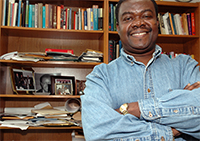Staying True to Self
Since arriving in 2002, Yaw Oheneba-Sakyi has helped give the Africana
Studies program prominence
By MAGGIE THACH
His office is located on the second floor of the McKee Fisk building.
You may have passed the office a time or two, not realizing the significance
or what his office stands for.

As the chair of the Africana and American Indian Studies department,
Dr. Yaw Oheneba-Sakyi has introduced new courses to the university.
“When I first came to Fresno State, I saw a lot of potential
in this department,” he said. Photos by Joseph
Hollak |
After all, it is not an office that looks enticing or attractive. At
least, not from the outside.
The only thing that differentiates it from any other office is its name
and title — AAIS, or Africana and American Indian Studies.
Very few know the actual importance of these four letters, but, for one
person, they represent revising the old, reviving the new and bettering
the change for the future.
For that person, Yaw Oheneba-Sakyi, these letters are revolutionary.
“When I first came to Fresno State, I saw a lot of potential within
this department,” department chair Oheneba-Sakyi said. “Changing
the name was just the first step.”
Africana and American Indian Studies, once known as the Ethnic Studies
program, was in disarray before Oheneba-Sakyi came along. The program
taught courses in subjects spanning from Armenian Studies to Asian-American
Studies to African and American Indian Studies.
Oheneba-Sakyi’s first order of business when he arrived at Fresno
State in August 2002 was to group all the classes together, and, ultimately,
change the name to something that would represent what the department
really stood for.
According to the CSU Fresno University Journal, Oheneba-Sakyi, who prefers
to be called Dr. Yaw, said, “the new name provides visibility and
brings clarity to the department’s mission in providing students
with appropriate knowledge and skills necessary to understand the history
and culture of African peoples all over the world and American Indians
in North America.”
Dr. Yaw’s plan for change within the department is based on four
pillars: building the identity, offering new courses while revising existing
ones, promoting student participation and encouraging community outreach.
Through these four pillars, Dr. Yaw believes the department’s full
potential can truly be reached.
"These interrelated themes will provide the building blocks for a
new image," Dr. Yaw said.
Creating a new identity was the biggest priority.
“A new name was the first move,” he said. “The name
represents the diaspora experiences of these cultures.”
Along with the new name, a new Web site was created to provide culture-appropriate
knowledge.
As a professor and chair of the Africana and American Indian Studies department,
Dr. Yaw has developed new courses for the growing department.
He has introduced critical thinking about race and African cultural perspectives,
both of which are additions to this year’s course catalog.
Student participation has been an essential aspect of rebuilding the new
image of the department, Dr. Yaw said.
“We also have a student newspaper and the Africana Student Union,”
he said.
The department also co-sponsors the African-American student recruitment
conference, a program that presents the opportunity to go to college as
an attractive and worthwhile experience for minority high school students.
These conferences allow the department to reach out to the community.
Dr. Yaw said he has been satisfied with the change he has seen since his
arrival two and a half year ago.
“In the Fall of 2002, there were only four majors available,”
Dr. Yaw said. “Now there are 19. We have seen results.”
These changes are only the beginning for the vision he sees for the AAIS
department.
"Students need to study the roots of their background, as well as
their future," Dr. Yaw said. "As chair, I’m responsible
for making sure our students are in a welcoming environment and are informed
about who we are and what we do."
He said the ability to help students was a driving force behind why he
came to Fresno.
"I don’t do this for money,” Dr. Yaw said. “I do
it because I challenge students to grow intellectually and humanly. Specifically,
I help students learn about culture and things they didn’t learn
in high school.
"My biggest satisfaction is to see my students graduate and come
back to see me,” Dr. Yaw said. “I want to be remembered as
someone who had a passion for students, someone who was always here to
help and give advice.”
He is so motivated to help, he said, because his passion is people.
“People inspire me,” Dr. Yaw said. “As a sociology major,
I ask a lot of questions. I want to know.”
The people who have inspired him the most include a laundry list of great
blacks in history. Among them are W.E.B. DuBois, Maya Angelou, Malcom
X, Martin Luther King Jr., Tony Morrison, Nelson Mandella, as well as
his grandparents and parents.
"I admire all these people because they had a vision and worked hard
to acclimate this vision," Dr. Yaw said.
Another great source of inspiration comes from proverbs he has heard over
the years.
"I believe in proverbs," Dr. Yaw said. "They say a lot
in a simple statement."
He has made a book of proverbs that sits on a coffee table in the department
office.
Perhaps the most applicable to Dr. Yaw’s life is this one: "Whatever
you do, you are going to be accountable for."
Dr. Yaw said he likes it because "it is a philosophy of life. I believe
in life. It is something God has given us. I believe in people’s
potential. If I can contribute, if I can help, I’m glad to do so."
|
